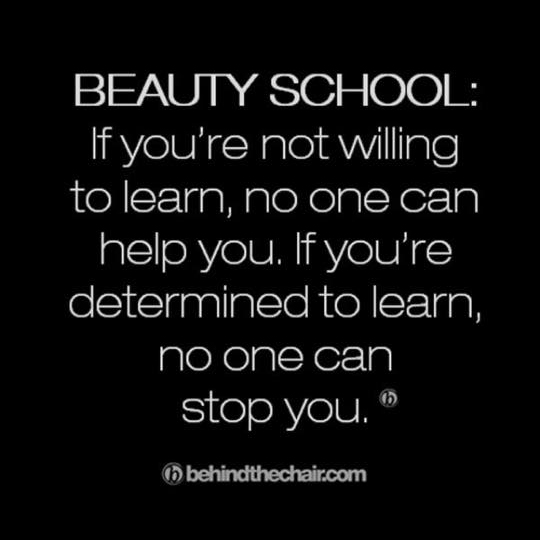What They Don’t Tell You In Beauty School: Starting Your Career
When one member of the #btcfam had questions about hiring (and keeping) salon assistants, you all had amazing advice (read it all here!). Then, that conversation set off another topic: what should new stylists know about beginning their career? It’s time for some #realtalk—keep reading!
We want to hear from you! Weigh in on the conversation!
Make sure your expectations are realistic
“When I started beauty school, our instructors always impressed upon us that it’ll take a good 4 to 6 years to build a STRONG clientele. And to stick with a place & not ‘chase money’ because you get discouraged.” – Leesa Jay
“Well it’s not all pink balayage and fashion shoots, and most of what you see on Instagram is not what most of us do in the salon every day. The thing they don’t tell you in beauty school is that getting your license is just the beginning. It takes time and effort to build a clientele, and it takes time and effort to refine your skills. So you have to remain teachable. Look for a good salon with a good education/training program. Oh, and don’t plan on making much money for a while, you will probably need a second job for the first 3 years. Be smart, and be professional.” – Mike Muniz
It’s true—hard work works
“On one side, salons don’t invest enough time into their apprentices and new graduates. However, based on what I’ve witnessed, the larger problem is that young stylists come into salons with established stylists and want what we have within the first year or they get frustrated and quit. Guess what? YOU CAN’T HAVE WHAT I HAVE! We have spent 10, 20, 30 years building our businesses. One thing is sure, newbies will achieve success and reach their goals…if they are realistic goals. As far as money goes, work two jobs. That’s what young bodies are able to do. If you want it badly enough, you’ll find a way.” – Jody Johnson
“This is literally what I did. Apprentice. Work two jobs. Build my book. And work my ass off. Three years in and I’m booked like I’ve been doing it for 10 years. [New graduates] want salons to hand them everything and that isn’t how it works.” – Ashley Morgan
“The real learning begins when, coming out of school, you realize that no one just hands you a book of clientele. You market, assist, observe, keep educated…if you want it bad enough, you might have to work a night job somewhere.” – Harmony Renee Marie
“Your passion needs to drive you to succeed, not your ego. Ego and talent are not the same thing. Owners and stylists need to invest time is teaching new stylist. And new stylist need to shut their mouths and open their ears. This is a business and it is constant growth, but first you need to learn the basics. The journey to the top takes time, don’t skip steps…what’s in style today may not be in 10 years, and if you don’t have the solid foundation of skills you’ll get left in the dust. Stay humble. Stay growing. Stay learning.” – Kelly Hurley
You are not above doing roller sets
“[Schools] only have time to teach the basics, so much of your learning comes with hands-on, in-salon education and continuing ed. I have to say though, there is something to be said for learning roller sets. They are the foundation and principle of a lot of updos and classic styles. Don’t take some of that info for granted.” – Alison Kelly
“Roller sets, pin curls and all the ‘old school’ techniques are really the basis of how to manipulate the hair and how we do most of our work. In my opinion, I feel these are lost and overlooked. It takes time to perfect what we do. It is so important to understand the basics to be able to build a foundation to make yourself great.” – Jennifer Bradley
“Everyone always wants to harp on roller sets and how they’re outdated and too much time is spent on them in school, but after 8 years in this industry, I don’t resent that time doing roller sets at all! It’s all about base control, which is the foundation of EVERYTHING.” – Bri Bowling
“I barely passed boards with my roller set. Hated them. Worked at a salon where every Friday and Saturday that is basically what we did. So, I took a class the salon offered and learned how. I also took other classes they offered. And I was one to pass my knowledge on. I did not know how much that helped someone until years later, I had worked with a former co-worker and she told everyone I taught her a lot.” – Cathy Goedtel
Find someone who is willing to teach (and be willing to learn)
“The real learning does begin after you get your license, and it occurs by getting your hands in hair all day. Learning happens through watching seasoned stylists and picking their brains and attending further education. But in my personal experience, the real learning happens when we make mistakes and go back honestly into our minds and figure out where we went wrong and how we can do better next time…There are a lot of factors that play a part as to why it’s so hard to keep new stylists and it’s up to us as stylists to really ask ourselves if we are truly helping our fellow newbies or just fluffing our own egos because we think we know more.” – Jennifer Sabrina
“Senior stylists that are established should support the junior stylists with passion for hair…the juniors that want what you have, and are willing to learn and work hard to be you, are worth investing in. Don’t discourage them, and some may surprise you and have what you have in less time, thanks to you…be a mentor, not a destroyer. You are their heroes, and they look up to you! Great success is your accomplishment for all your hard work, and that’s what we should teach as heroes!” – Sara Bale
“I think sometimes as seasoned stylists, we forget what it’s like to be fresh and new. We forget how terrifying and discouraging it can be. I don’t think many schools really prepare stylists with understanding that it’s going to get even harder before it gets easy.” – Katrina Haynes
“Yes! Most of your learning comes from experience. But, my experience with new stylists these days is they don’t typically want the help! They come into thinking they know everything because they ‘graduated’ and have that license, when in reality they need a good mentor. When they fail, or they aren’t gaining clients fast enough to make a good check, they give up and quit! It takes time, and a lot of it! I think newbies think what we know isn’t valid because in their minds they know better because they have ‘fresh’ knowledge compared to ours. When really, it’s the seasoning in our knowledge that they need!” – MiKala Kirk
“It took me going to the salon I work at afterschool and watching. Sitting and learning what they did helped me. I could do a perm and set with my eyes closed, Still ran out the back door when a men’s cut came in the front . 😂 I’ve been at it 7 years and I still learn something new most weeks, because I’m willing to learn.” – Bridget Carter
“As a brand new stylist, I am amazed at the cuts and colors that the other more experienced stylists do, and they make it look so easy! I have landed in a great salon with an amazing manager and one of the other stylists has offered to mentor me. I do feel completely unprepared.” – Julia Bartlam
Salon owners: Treat all stylists with respect
“I can tell you firsthand: a lot of salons see apprentices as cleaning ladies. These people just graduated and have student loans to pay. I remember I got offered a job that paid me $7.50 out of cosmetology school, the ‘extra’ training I received was nothing new, I just felt like I was hired to clean and was looked down on instead of an equal. I had to quit within two months for another job that paid me $10 per hour doing something I didn’t go to school for, just to pay back loans. I decided to do booth rental and onsite bridal work, taking extra classes in coloring and cut on my own terms by figuring out what was in my area and going to hair shows, and building a clientele. If a salon had paid me more, and I received better knowledge, I probably would have stuck it out in a salon as an apprentice.” – Tiffany Beckler
“My very first job as a stylist was horrible. The seasoned stylists were so very rude and wouldn’t take me under their wing. If I had questions, they treated me condescendingly. I left after 3 months (I cried everyday on my way to work and on my way home). I then found a job in a smaller salon where the two stylists took me under their wing and loved when I asked questions. They were eager to teach me new things and helped me master areas I wanted to grow in. I had to work harder at building a clientele because we didn’t have walk-ins due to location. But it was well worth it. I felt loved, I felt celebrated, and I felt safe. I will forever be grateful to those two very special people for seeing my gift and helping me develop it further.” – LeighAnn Johnson
“I have learned 98% of my skills thus far behind the chair. And I am still passionate about learning every day. Our fellow stylists that we work with are a wealth of information. No matter how long they been behind the chair. I have been very fortunate to work with such a great team, and even more blessed to work with JCPenney Salon. They have such a great program that encourages growth through ongoing classes through the year, as well as opportunities for advancement. I have had people pull me under their wing when I first started 3 years ago, and I have given back and pulled newbies under my wing as well. Absolutely love what I do!” – Leesa Jay
“I’m still an apprentice, but I’m working on clients full-time. I’ve learned plenty so far. I think a lot of it is about finding the right fit on a team somewhere. This is the third salon where I’ve worked and the first time that I really felt like I’ve been treated like an equal instead of just the shampoo girl or like someone wanted to tell me what my color formulas should be. I did well in school and didn’t appreciate being looked down on. I don’t think I know it all or have a lot to learn, but if you want to correct me, then tell me what’s wrong with my idea and why what you’re suggesting is better. I don’t learn by being bullied.” – Erin Hawkins







